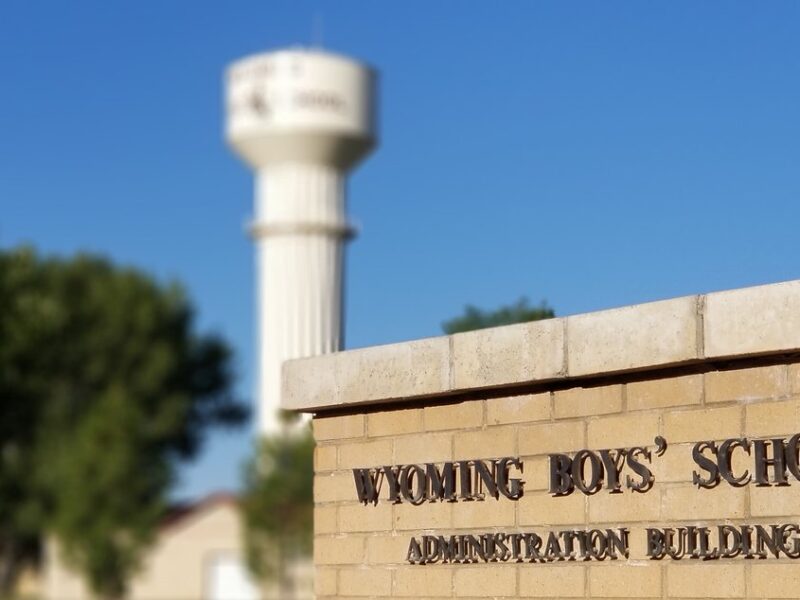Senate Passes Bill Establishing Statewide Juvenile Justice Reporting System
Bill now heads to the governor’s desk
- Published In: Criminal Justice
- Last Updated: Mar 04, 2022

The Wyoming Boys' School in Worland is a facility for adjudicated delinquent males ages 12 to 21. A 2019 report found that Wyoming incarcerated 239 out of every 100,000 juveniles. A bill that's passed the House and Senate would require the comprehensive collection of juvenile justice data, which advocates say could shed light on Wyoming's high incarceration rate. (Photo courtesy of the Wyoming Department of Family Services)
By Shen Wu Tan
Special to the Wyoming Truth
The state Senate has unanimously approved a bill to create and regulate Wyoming’s first comprehensive juvenile justice reporting system, a move aimed at addressing the Cowboy state’s perennial problem with juvenile incarceration.
The legislation, which has now passed both chambers of the Wyoming legislature, heads to the governor’s desk. Gov. Mark Gordon has three days to sign the bill into law or veto it once it reaches his desk.
Lindsey Schilling, senior social services administrator for the Wyoming Department of Family Services, said it became evident there was no comprehensive way to collect or report juvenile justice data when lawmakers earlier tried to identify potential reform strategies to combat Wyoming’s high juvenile out-of-home placement rate. Wyoming ranked fourth in the nation for the highest juvenile incarceration rate in 2019, according to the latest figures.
“Without the data to understand the ‘problem,’ policy makers were hesitant to proceed with changes to law,” Schilling told the Wyoming Truth. “The focus then shifted to standing up a data collection system that could capture the items of interest…Using the data collected, the department will be positioned to work collaboratively with system partners to identify the challenges or ‘gaps’ in Wyoming’s current juvenile justice system, and to provide data driven recommendations to policymakers on ways they could consider moving forward.”
The legislation makes the Wyoming Department of Family Services the central authority and hub for juvenile justice data collection and requires state and local government entities to submit certain information to the department. Until now, Wyoming has not been able to reliably gather statewide juvenile justice data.
For cases involving a juvenile who is convicted of an offense or adjudicated for a delinquent act, the department would be required to collect the juvenile offender’s name, social security number, date of birth, physical description and address of last known residence. The department would also have to gather data on the juvenile’s criminal offense, the juvenile court where the youth was adjudicated delinquent or convicted and information on the final disposition ordered by the court, including if the juvenile was committed to detention or treatment, ordered to serve probation or participate in an intensive supervision program, or held in pretrial detention.

“We will finally have information about what happens to juveniles in our justice system,” said Narina Nunez, a psychology and law professor at the University of Wyoming and a member of the Wyoming State Advisory Council on Juvenile Justice, a group of members with experience or knowledge about juvenile justice or the prevention or treatment of juvenile delinquency. “The Joint Judiciary wanted to consider juvenile justice reform but quickly realized that without data they did not know what needed reform. It will help inform policy. If there are programs that aren’t working, we’ll be able to know. We can shift resources to programs that work. It will help us make better decisions.”
Wyoming incarcerated 239 out of every 100,000 juveniles in 2019, outranked only by Washington, D.C., (262 per 100,000), West Virginia (291 per 100,000 juveniles) and Alaska (330 per 100,000 juveniles), the latest Easy Access to the Census of Juveniles in Residential Placement report shows.
The juvenile justice data collection legislation would become effective July 1, 2024 if signed into law.
The bill also allocates $251,848 from the general fund for the Department of Family Services to fund a full-time position for data collection and related costs from July 1 through June 30, 2024. Legislators approved $450,000 from the general fund to the department to establish a computer program for data entry and collection for the same period.













